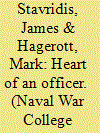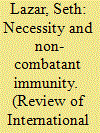|
|
|
Sort Order |
|
|
|
Items / Page
|
|
|
|
|
|
|
| Srl | Item |
| 1 |
ID:
087262


|
|
|
| 2 |
ID:
137787


|
|
|
|
|
| Summary/Abstract |
One of the goals of peacekeeping operations is limiting the amount of violence that takes place during a civil war. However, peacekeeping forces cannot occupy every part of a country that is engulfed in a civil conflict. This raises the question as to where peacekeeping forces decide to go once they are deployed to a civil war-torn country. In this article, we contribute to the burgeoning research that examines peacekeeping at the microlevel by attempting to determine whether peacekeeping operations go to those areas that are in most need of their help. Utilizing geocoded data from the UCDP GED and PKOLED projects, we use spatial analysis techniques to create kernel density estimates of civil war violence and peacekeeping operations at site-specific locations. We then use these newly generated variables in a variety of regression models to determine whether the location of civil war battles influences the location of peacekeepers. The analysis confirms our expectations in that the location of violence significantly predicts the location of peacekeeping operations, but only after these operations have been in a civil war-torn country for a considerable length of time. Contrary to our expectations, however, peacekeeping operations do not seem more adept at identifying and responding to government and rebel violence relative to attacks against civilians
|
|
|
|
|
|
|
|
|
|
|
|
|
|
|
|
| 3 |
ID:
131697


|
|
|
|
|
| Publication |
2014.
|
| Summary/Abstract |
The principle of non-combatant immunity protects non-combatants against intentional attacks in war. It is the most widely endorsed and deeply held moral constraint on the conduct of war. And yet it is difficult to justify. Recent developments in just war theory have undermined the canonical argument in its favour - Michael Walzer's, in Just and Unjust Wars. Some now deny that non-combatant immunity has principled foundations, arguing instead that it is entirely explained by a different principle: that of necessity. In war, as in ordinary life, harms to others can be justified only if they are necessary. Attacking non-combatants, the argument goes, is never necessary, so never justified. Although often repeated, this argument has never been explored in depth. In this article, I evaluate the necessity-based argument for non-combatant immunity, drawing together theoretical analysis and empirical research on anti-civilian tactics in interstate warfare, counterinsurgency, and terrorism.
|
|
|
|
|
|
|
|
|
|
|
|
|
|
|
|
| 4 |
ID:
060242


|
|
|
| 5 |
ID:
137788


|
|
|
|
|
| Summary/Abstract |
A rich literature has developed focusing on the efficacy of peacekeeping operations (PKOs) in a temporal sense—asking whether the periods following a deployment are more peaceful or not. We know less about the efficacy of PKOs in a spatial sense. Can peacekeeping shape the geographic dispersion of particular episodes of violence? We posit that PKOs can contain conflict by decreasing the tactical advantage of mobility for the rebels, by obstructing the movement of armed actors, and by altering the ability for governments to seek and confront rebel actors. We investigate the observable implications using georeferenced conflict polygons from the Uppsala Conflict Data Program's (UCDP) Georeferenced Event Dataset (GED). Our findings confirm that PKOs tend to decrease movement in the conflict polygons, especially when robust forces are deployed and when rebel groups have strong ethnic ties. Our findings, on the one hand, imply that PKOs reduce the geographic scope of violence. On the other hand, PKOs may allow nonstate actors to gain strength and legitimacy and thus constitute an even greater future threat to the state whether some form of accord is not reached.
|
|
|
|
|
|
|
|
|
|
|
|
|
|
|
|
| 6 |
ID:
122703


|
|
|
|
|
| Publication |
2012.
|
| Summary/Abstract |
The chief of land forces (Italy) in the member of representative counties detail the reform processes through which their services are adapting their respective structures, equipment and doctrines to the new requirements of our times.
The Italian Army-Playing an Important role in International Operations
|
|
|
|
|
|
|
|
|
|
|
|
|
|
|
|
| 7 |
ID:
115319


|
|
|
|
|
| Publication |
2012.
|
| Summary/Abstract |
Multilateral interventions for regime change are not new, but their mutation has been congruent with an aggressive attempt to introduce liberal values into peacekeeping and related operations discernible from the 1990s. While recognizing non-coercive, needs-based elements of interventions for peace, this article contends that regime change wars have harmonized with the UN's facilitation of aggressive peace missions and coercive peacebuilding. In the 1990s the perceived failures of, and demands on, the UN, led to a general policy of permissiveness for Western states to pursue regime change, accompanied by reconstruction and development opportunities to promote neoliberal ideas of political economy in war-torn societies. This article focuses on two aspects of international operations fostered through or by the UN: the militarization of peace missions and peacebuilding through neoliberal political economy. It commends further research into the networks of power and resistance that have populated aggressive peace.
|
|
|
|
|
|
|
|
|
|
|
|
|
|
|
|
| 8 |
ID:
134208


|
|
|
|
|
| Publication |
2014.
|
| Summary/Abstract |
The end of the Cold War should also have meant the coming of the flourishing of international law, many (myself included) naively believed. However, the "uni-polar moment" that gained momentum in the 1990s, though its life-span turned out to be rather short, saw a gung ho attitude towards foundational principles of international law such as non-use of force and non-interference in internal affairs of states. NATO's 1999 operation over Kosovo, the 2003 invasion of Iraq, the 2008 Georgia-Russia war, policies reflected in the slogan "all the options are on the table", and now Ukraine's tragedy show that international law and morality are used mainly as covers in the geopolitical struggle. If the Cold War manifested the competition between two ideologies-capitalism and communism-today's main historical controversy is between the uni-polar and multi-polar visions of the world. It is not ideological, it is geopolitical, where ideology, morality and law are used as tools and collaterals in the struggle for the configuration of tomorrow's world. It is also a struggle for the nature of international law. Will it become a kind of supra-national law (à la EU law for the whole world) dictated from one centre, or will it develop as a legal system based on the balance of interests and values of different states and cultures? The author believes that the world is simply too big, complex and diverse for the first choice to realize in practice. Its rich tapestry cannot be flattened into a carpet where one pattern, be it of a Judeo-Christian, Anglo-Saxon, Confucian, Muslim or even secular liberal-democratic pattern, prevails. Attempts to force one, "the only true", vision on the whole world not only undermine international law; they are also utopian endeavours fraught with endless conflicts.
|
|
|
|
|
|
|
|
|
|
|
|
|
|
|
|
|
|
|
|
|